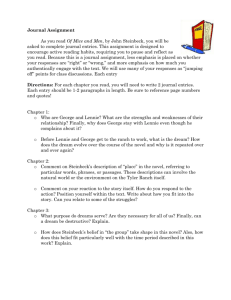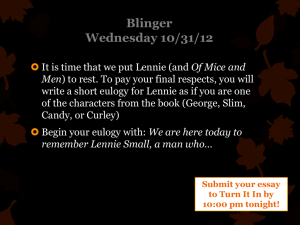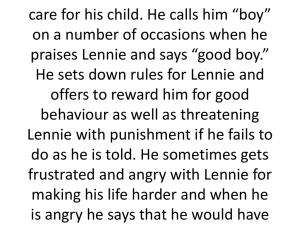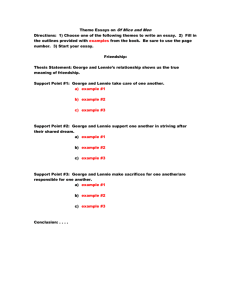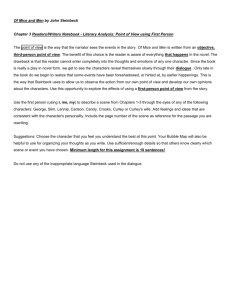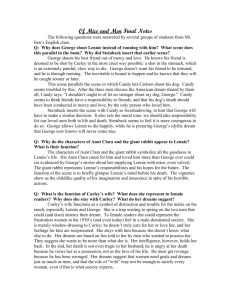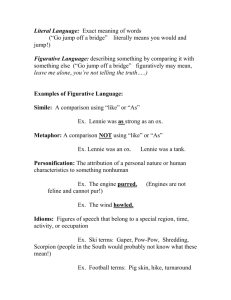OF MICE AND MEN
advertisement
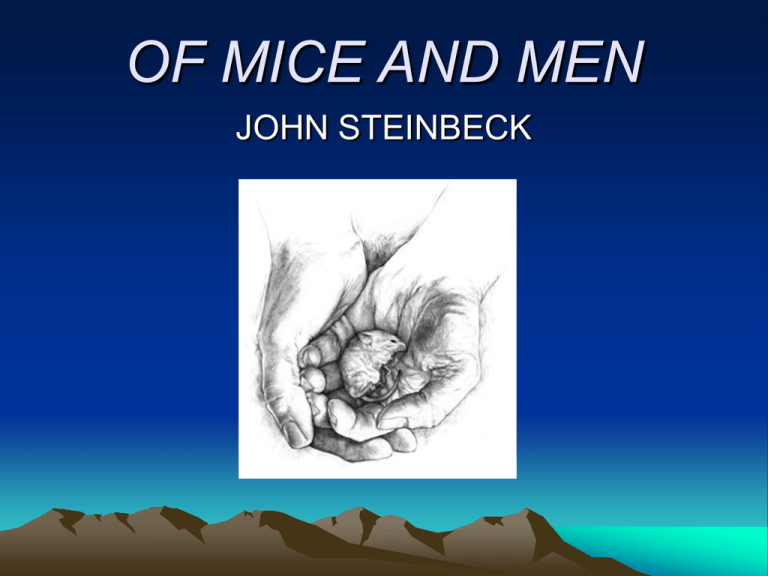
OF MICE AND MEN JOHN STEINBECK JOHN STEINBECK • John Steinbeck was born in 1902 in Salinas, California, a region that became the setting for much of his fiction, including Of Mice and Men. JOHN STEINBECK • In 1919, he enrolled at Stanford University, where he studied intermittently for the next six years before finally leaving without having earned a degree. JOHN STEINBECK • • • • JOBS INCLUDED: LABORER JOURNALIST IN NEW YORK CITY CARETAKER FOR A LAKE TAHOE ESTATE • FILMMAKER JOHN STEINBECK • • • • • • • • • NOVELS INCLUDED: CUP OF GOLD 1929 THE PASTURES OF HEAVEN 1932 TO A GOD UNKNOWN 1933 THE LONG VALLEY 1938 TORTILLA FLAT 1935 IN DUBIOUS BATTLES 1936 The Grapes of Wrath 1939 THE FORGOTTEN VILLAGE 1941 NOVELS CONTINUED • • • • • • • • SEA OF CORTEZ1941 BOMBS AWAY 1942 THE MOON IS DOWN 1942 CANNERY ROW 1945 THE WAYWARD BUS 1947 THE PEARL 1947 A RUSSIAN JOURNAL 1948 BURNING BRIGHT 1950 NOVELS CONTINUED • • • • THE LOG FROM THE SEA 1951 EAST OF EDEN 1952 SWEET THURSDAY 1954 THE WINTER OF OUR DISCONTENT 1961 • TRAVELS WITH CHARLEY IN SEARCH OF AMERICA 1962 OF MICE AND MEN • Steinbeck won the Nobel Prize in 1962 • In his acceptance speech for the 1962 Nobel Prize in literature, Steinbeck said: • . . . the writer is delegated to declare and to celebrate man’s proven capacity for greatness of heart and spirit— for gallantry in defeat, for courage, compassion and love. In the endless war against weakness and despair, these are the bright rally flags of hope and of emulation. I hold that a writer who does not passionately believe in the perfectibility of man has no dedication nor any membership in literature. • A poem by Robert Burns, "To a Mouse" is about a farm worker who plows up a mouse and the hard work the mouse had done to create a home for itself. The line"The best-laid plans of mice and men often go awry" is the reference of the title. Both the novel and the poem deal with weaker creatures who are trapped in a world where they have little power and they can be wiped out with little or no regard. In the poem , the farm worker looks with sadness and compassion at the mouse and apologizes for destroying all its efforts. He then contemplates the reality of mortality. Steinbeck does the same with the ill-equipped George and Lennie. To A Mouse by Robert Burns • Wee, sleeket, cowran, tim'rous beastie, O, what panic's in thy breastie! Thou need na start awa sae hasty, Wi' bickering brattle! I wad be laith to rin an' chase thee, Wi' murd'ring pattle! • I'm truly sorry Man's dominion Has broken Nature's social union, An' justifies that ill opinion, Which makes thee startle, At me, thy poor, earth-born companion, An' fellow-mortal! • The poet is doing his utmost to assure this terrified little creature that he has no intention of causing it any harm. bickerin’ brattle =scurry, run; laith = loath; pattle = a small spade for cleaning a plough • He then goes on to apologise to the mouse for the behaviour of mankind using beautiful prose which requires neither translation nor interpretation. Listen to what he is saying, and you will be well on your way to understand what made Burns such a greatly loved man. Note how he equates himself with the mouse in life’s great plan • I doubt na, whyles, but thou may thieve; What then? poor beastie, thou maun live! A daimen-icker in a thrave 'S a sma' request: I'll get a blessin wi' the lave, An' never miss't! • • • Thy wee-bit housie, too, in ruin! It's silly wa's the win's are strewin! An' naething, now, to big a new ane, O' foggage green! An' bleak December's winds ensuin, Baith snell an' keen! • • Here he tells the mouse that he realizes its need to steal the odd ear of corn, and he does not really mind. He’ll get by with remainder and never miss it. daimen = occasional; icker = an ear of corn; thrave = twenty four sheaves; lave = remainder • Dismay at the enormity of the problems he has brought on the mouse causes him to reflect on what he has done destroyed her home at a time when it is impossible to rebuild. There is no grass to build a new home and the December winds are cold and sharp. Her preparations for winter are gone! Big = build; foggage = moss; baith = both • Thou saw the fields laid bare an' wast, An' weary Winter comin fast, An' cozie here, beneath the blast, Thou thought to dwell, Till crash! the cruel coulter past Out thro' thy cell. • • That wee-bit heap o' leaves an' stibble, Has cost thee monie a weary nibble! Now thou's turn'd out, for a' thy trouble, But house or hald. To thole the Winter's sleety dribble, An' cranreuch cauld! Where the mouse had thought that she was prepared for winter in her comfortable little nest in the ground, now she is faced with trying to survive in a most unfriendly climate, with little or no hope in sight. cosie = comfortable; coulter; = iron cutter in front of a ploughshare It seems probable that here the poet is really comparing his own hard times with that of the mouse – a life of harsh struggle, with little or no reward at the end. monie = many; thole = to endure; dribble = drizzle; cranreuch = hoarfrost; cauld = cold • • • But Mousie, thou are no thy-lane, In proving foresight may be vain: The best laid schemes o' Mice an' Men, Gang aft agley, An' lea'e us nought but grief an' pain, For promis'd joy! Still, thou art blest, compar'd wi' me! The present only toucheth thee: But Och! I backward cast my e'e, On prospects drear! An' forward, tho' I canna see, I guess an' fear! • • How many times have people glibly trotted out, “The best laid schemes” without realising that they were quoting from Burns? The sadness, the despair, the insight contained within this verse are truly remarkable and deeply moving. no ‘thy lane = not alone; gan aft agley = often go awry This final verse reveals the absolute despondency that Burns was feeling at this stage in his life. Not at all what one might expect from a young man of twenty-six, supposedly so popular with the lassies, and with his whole life ahead of him, but nevertheless expressing sentiments with which many of us today can easily relate. • Steinbeck’s bestknown works deal intimately with the plight of desperately poor California wanderers, who, despite the cruelty of their circumstances, often triumph spiritually. The Grapes of Wrath won the 1940 Pulitzer Prize and became Steinbeck’s most famous novel. Steinbeck sets Of Mice and Men against the backdrop of Depression-era America. The economic conditions of the time victimized workers like George and Lennie, whose quest for land was thwarted by cruel and powerful forces beyond their control, but whose tragedy was marked, ultimately, by steadfast compassion and love. The History of Migrant Farmers in California • After World War I, economic and ecological forces brought many rural poor and migrant agricultural workers from the Great Plains states, such as Oklahoma, Texas, and Kansas, to California. Following World War I, a recession led to a drop in the market price of farm crops, which meant that farmers were forced to produce more goods in order to earn the same amount of money. To meet this demand for increased productivity, many farmers bought more land and invested in expensive agricultural equipment, which plunged them into debt. The stock market crash of 1929 only made matters worse. Banks were forced to foreclose on mortgages and collect debts. Unable to pay their creditors, many farmers lost their property and were forced to find other work. But doing so proved very difficult, since the nation’s unemployment rate had skyrocketed, peaking at nearly twenty-five percent in 1933. Migrant Farmers in California • The increase in farming activity across the Great Plains states caused the precious soil to erode. This erosion, coupled with a seven-year drought that began in 1931, turned once fertile grasslands into a desertlike region known as the Dust Bowl. Hundreds of thousands of farmers packed up their families and few belongings, and headed for California, which, for numerous reasons, seemed like a promised land. Migrant workers came to be known as Okies, for although they came from many states across the Great Plains, twenty percent of the farmers were originally from Oklahoma. Okies were often met with scorn by California farmers and natives, which only made their dislocation and poverty even more unpleasant. Migrant Farmers in California • John Steinbeck immortalized the plight of one such family, the Joads, in his most famous novel, The Grapes of Wrath. In several of his fiction works, including Of Mice and Men, Steinbeck illustrates how grueling, challenging, and often unrewarding the life of migrant farmers could be. Just as George and Lennie dream of a better life on their own farm, the Great Plains farmers dreamed of finding a better life in California. The state’s mild climate promised a longer growing season and, with soil favorable to a wider range of crops, it offered more opportunities to harvest. Despite these promises, though, very few found it to be the land of opportunity and plenty of which they dreamed. LENNIE • A large, lumbering, childlike migrant worker. Due to his mild mental disability, Lennie completely depends upon George, his friend and traveling companion, for guidance and protection. The two men share a vision of a farm that they will own together, a vision that Lennie believes in wholeheartedly. Gentle and kind, Lennie nevertheless does not understand his own strength. His love of petting soft things, such as small animals, dresses, and people’s hair, leads to disaster. George • A small, wiry, quick-witted man who travels with, and cares for, Lennie. Although he frequently speaks of how much better his life would be without his caretaking responsibilities, George is obviously devoted to Lennie. George’s behavior is motivated by the desire to protect Lennie and, eventually, deliver them both to the farm of their dreams. Though George is the source for the oftentold story of life on their future farm, it is Lennie’s childlike faith that enables George to actually believe his account of their future. Candy • An aging ranch handyman, Candy lost his hand in an accident and worries about his future on the ranch. Fearing that his age is making him useless, he seizes on George’s description of the farm he and Lennie will have, offering his life’s savings if he can join George and Lennie in owning the land. The fate of Candy’s ancient dog, which Carlson shoots in the back of the head in an alleged act of mercy, foreshadows the manner of Lennie’s death. Curley • The boss’s son, Curley wears high-heeled boots to distinguish himself from the field hands. Rumored to be a champion prizefighter, he is a confrontational, meanspirited, and aggressive young man who seeks to compensate for his small stature by picking fights with larger men. Recently married, Curley is plagued with jealous suspicions and is extremely possessive of his flirtatious young wife. Curley’s Wife • The only female character in the novel, Curley’s wife is never given a name and is only referred to in reference to her husband. The men on the farm refer to her as a “tramp,” a “tart,” and a “looloo.” Dressed in fancy, feathered red shoes, she represents the temptation of female sexuality in a male-dominated world. Steinbeck depicts Curley’s wife not as a villain, but rather as a victim. Like the ranch-hands, she is desperately lonely and has broken dreams of a better life. Themes • Themes are the fundamental and often universal ideas explored in a literary work. The Predatory Nature of Human Existence • Of Mice and Men teaches a grim lesson about the nature of human existence. Nearly all of the characters, including George, Lennie, Candy, Crooks, and Curley’s wife, admit, at one time or another, to having a profound sense of loneliness and isolation. Each desires the comfort of a friend, but will settle for the attentive ear of a stranger. The Predatory Nature of Human Existence • Steinbeck records a profound human truth: oppression does not come only from the hands of the strong or the powerful. The novel suggests that the most visible kind of strength, that used to oppress others, is itself born of weakness. Fraternity and the Idealized Male Friendship • One of the reasons that the tragic end of George and Lennie’s friendship has such a profound impact is that one senses that the friends have, by the end of the novel, lost a dream larger than themselves. Ultimately, however, the world is too harsh and predatory a place to sustain such relationships. Lennie and George, who come closest to achieving this ideal of brotherhood, are forced to separate tragically. • Friendship: Every man needs someone to make him feel special. • George and Lennie share a bond so strong that when one is destroyed, the other inevitably is as well. Steinbeck often stresses how ranchers are loners, and George and Lennie are the only ones who travel in pairs. They seem to be two halves of the same person, and they know how special together they truly are. "Guys like us, that work on ranches, are the loneliest guys in the world...They got no family. They don't belong no place...With us, it ain't like that. We got a future. We got somebody to talk to that gives a damn about us..." • Candy's need for the companionship of his dog also stresses the importance of true friendship. For, after the passing of his old dog, Candy attaches himself to the dream Lennie and The Impossibility of the American Dream • Most of the characters in Of Mice and Men admit, at one point or another, to dreaming of a different life. What makes all of these dreams typically American is that the dreamers wish for untarnished happiness, for the freedom to follow their own desires. However, such paradises of freedom, contentment, and safety are not to be found in this world. • The American Dream: Everyone has a dream to strive for. The poor ranch hands wish to be their own bosses, and actually have stability. • George and Lennie have a dream, even before they arrive at their new job on the ranch, to make enough money to live "off the fat of the land" and be their own bosses. Lennie will be permitted, then, to tend the rabbits. • Candy, upon hearing about the dream, wanted to join them so that he would not be left alone, especially after they killed his old dog. • Crooks, the Negro outcast, wanted to join them so that he wouldn't be alone. Motifs • Motifs are recurring structures, contrasts, or literary devices that can help to develop and inform the text’s major themes. The Corrupting Power of Women • The portrayal of women in Of Mice and Men is limited and unflattering. We learn early on that Lennie and George are on the run from the previous ranch where they worked, due to encountering trouble there with a woman. Misunderstanding Lennie’s love of soft things, a woman accused him of rape for touching her dress. George berates Lennie for his behavior, but is convinced that women are always the cause of such trouble. Their enticing sexuality, he believes, tempts men to behave in ways they would otherwise not. • Although Steinbeck does, finally, offer a sympathetic view of Curley’s wife by allowing her to voice her unhappiness and her own dream for a better life, women have no place in the author’s idealized vision of a world structured around the brotherly bonds of men. Loneliness and Companionship • Many of the characters admit to suffering from profound loneliness. George sets the tone for these confessions early in the novel when he reminds Lennie that the life of a ranch-hand is among the loneliest of lives. Each of the characters searches for a friend, someone to help them measure the world, as Crooks says. In the end, however, companionship of his kind seems unattainable. • Loneliness: Throughout the novel, a main characteristic most of the characters contained was being lonely. • Candy has only his dog as his one companion. Upon the killing of the dog, he has no one and therefore, attaches himself to the dream George and Lennie share. Thus, he will not end up an outcast and therefore, completely alone. Even after Lennie kills Curley's wife and cannot return to his life the way it was before, Candy still wants to carry out the dream. • Crooks feels "...A guys goes nuts if he ain't got nobody. Don't make no difference who the guy is, long's he with you..." He would work for nothing, as long as he could communicate with others. • Curley's wife is so overwhelmed by her loneliness, she seeks friendship from other men. She seeks out the friendship of Lennie for all of the others fear Curley and will have nothing to do with her. "Think I don't like to talk to somebody ever' once in a while?" Strength and Weakness • Steinbeck explores different types of strength and weakness throughout the novel. The first, and most obvious, is physical strength. As the novel opens, Steinbeck shows how Lennie possesses physical strength beyond his control, as when he cannot help killing the mice. Great physical strength is, like money, quite valuable to men in George and Lennie’s circumstances. Curley, as a symbol of authority on the ranch and a champion boxer, makes this clear immediately by using his brutish strength and violent temper to intimidate the men and his wife. Strength and Weakness • Physical strength is not the only force that oppresses the men in the novel. It is the rigid, predatory human tendencies, not Curley, that defeat Lennie and George in the end. Lennie’s physical size and strength prove powerless; in the face of these universal laws, he is utterly defenseless and therefore disposable. Symbols • Symbols are objects, characters, figures, or colors used to represent abstract ideas or concepts. George and Lennie’s Farm • The farm that George constantly describes to Lennie, those few acres of land on which they will grow their own food and tend their own livestock, is one of the most powerful symbols in the book. It seduces not only the other characters but also the reader, who, like the men, wants to believe in the possibility of the free, idyllic life it promises. George and Lennie’s Farm • A paradise for men who want to be masters of their own lives, the farm represents the possibility of freedom, selfreliance, and protection from the cruelties of the world. Lennie’s Puppy • Lennie’s puppy is one of several symbols that represent the victory of the strong over the weak. Lennie kills the puppy accidentally, as he has killed many mice before, by virtue of his failure to recognize his own strength. Although no other character can match Lennie’s physical strength, the huge Lennie will soon meet a fate similar to that of his small puppy. Like an innocent animal, Lennie is unaware of the vicious, predatory powers that surround him. Candy’s Dog • In the world Of Mice and Men describes, Candy’s dog represents the fate awaiting anyone who has outlived his or her purpose. Once a fine sheepdog, useful on the ranch, Candy’s mutt is now debilitated by age. Candy’s sentimental attachment to the animal—his plea that Carlson let the dog live for no other reason than that Candy raised it from a puppy—means nothing at all on the ranch. Although Carlson promises to kill the dog painlessly, his insistence that the old animal must die supports a cruel natural law that the strong will dispose of the weak. Candy internalizes this lesson, for he fears that he himself is nearing an age when he will no longer be useful at the ranch, and therefore no longer welcome. Morals/Lessons/Applications: • People need others to talk to to survive. (Crooks' statement about needing someone or going crazy, the attachment of Crooks and Candy to the dream Lennie and George share, Curley's wife seduction of the ranch hands as a buffer against loneliness) • A man's ability to dream is directly attached to having someone to share the dream with. (George lets go of the dream after Lennie is killed.) • Sometimes, even though it's not what you want, you have to do what's best for you and those you love. (George shoots his best friend, Lennie so that Lennie can escape a brutal lynching.) Key Facts • genre · Fiction; tragedy • time and place written · Mid-1930s; Pacific Grove and Los Gatos ranch, California • date of first publication · 1937 • narrator · Third-person omniscient • protagonists · George and Lennie • antagonists · Curley; society; the cruel, predatory nature of human life • setting (time) · 1930s • setting (place) · South of Soledad, California Key Facts • point of view · The novel is told from the point of view of a third-person omniscient narrator, who can access the point of view of any character as required by the narrative. • tone · Sentimental, tragic, doomed, fatalistic, rustic, moralistic, comic Essays • Essays on Of Mice and Men • Violence and Sadism in John Steinbeck's Of Mice and Men • Camaraderie: Deciding an Individual's Fate • The Lost American Dream • How are George in Of Mice and Men and the farmer of the poem by Robert Burns connected? SYMBOLISM • The book Of Mice and Men symbolises Steinbecks Marxist views on the American Dream being used to control the masses and prevent a revolution in the great depression. It also reflects his feminist views with women being portrayed only as whores and mother figures, his opinions against racism with Crook's dream of racial inequality being somewhat unachievable and his ironic view that the happiest men (Curly and Carlson in the book) are those who have no dreams to be smashed! Quite funny really, considering this was the book that made him his millions! • In referring to the "general symbolism", I assume you are referring to what the story represents. You could also be asking about the symbolism of the title. I will present you with both answers. • The title refers to a poem by Robert Burns which includes these lines: • "the best laid plans o' mice and men/often do go wrong" • The book demonstrates this title through the characters of George and Lenny primarily. They have big plans of having their own place, being their own family and their own boss. Their plans seem possible when they meet Candy, who wants very much to join them. However, the disability of Lenny and the tragic events that cause him to mistakenly kill Curley's wife, put these plans to an end. • Overall, this book represents the isolation caused by the depression. The men and the one woman of this story have been isolated by a lack of choices and by poverty. They are all struggling to survive and have to abandon many dreams in order to do so. This causes them to become closed off, angry, and despondent. They turn on one another in their attempt to get ahead. The exceptions are George and Lenny, who have each other - until the end, when they two are isolated by their situation. Of Mice and Men
